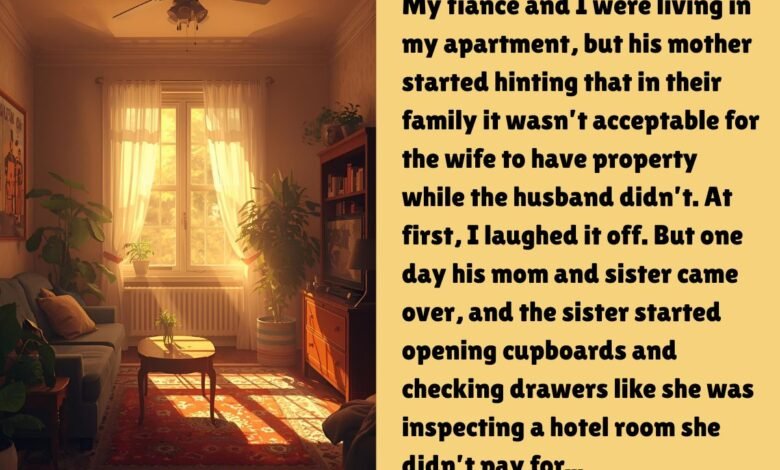
My fiancé and I were living in my apartment, but his mother started hinting that in their family it wasn’t acceptable for the wife to have property while the husband didn’t. At first, I laughed it off. But one day his mom and sister came over, and the sister started opening cupboards and checking drawers like she was inspecting a hotel room she didn’t pay for.
She even made a joke about “finally seeing where her brother lives temporarily… before they fix this arrangement.” Her tone wasn’t lighthearted. It had that passive-aggressive sting that’s too obvious to ignore but subtle enough to deny.
I stood in the kitchen, frozen, while his mom sipped tea and smiled politely—too politely. My fiancé, Denis, acted like it was all normal. He even laughed and told his sister to stop snooping, but he didn’t actually stop her. That moment didn’t sit right with me.
Later that evening, I brought it up gently. I told Denis that I didn’t appreciate the way they acted like the apartment was just some phase he was going through.
He shrugged. “It’s just family. They don’t mean harm. But… maybe they’re right. Maybe we should start looking for a place that’s ours, not just yours.”
I stared at him, completely thrown. This apartment wasn’t just a building. I’d worked two jobs for three years, skipped vacations, skipped nights out, and bought second-hand furniture until I could save enough for a down payment. It wasn’t fancy, but it was mine.
“I’m not asking you to move out,” I said slowly. “But don’t forget—I didn’t ask you to move in either. You insisted.”
He ran a hand through his hair, looking frustrated. “I know. I know. But maybe we should sell this and buy something together.”
I blinked. “You mean, I should sell this and we buy something with my money?”
There was a long silence. He didn’t say yes. But he didn’t say no either.
That night I couldn’t sleep. Not because of what was said, but because of what wasn’t.
I tried to push it out of my mind for the next few weeks. I told myself that relationships are about compromise. Maybe I was being too proud. Maybe I needed to let go of control a little.
Then one evening I came home early from work. The apartment was too quiet, but the front door was unlocked. I walked in and heard low voices from the living room.
Denis was sitting with his mom and sister again. They had my laptop open, and there were open folders on the coffee table—papers from my filing cabinet, my mortgage documents, even my savings statements.
I stepped into the room. “What is going on?”
His sister jumped up like she’d been caught stealing. Denis looked like a deer in headlights. His mom didn’t even flinch.
“We were just looking at options,” his mother said calmly. “Trying to understand what this place is worth and what kind of property you both could upgrade to.”
My voice trembled, but not from fear. “You went through my private documents?”
Denis stood up. “Okay, this looks bad, but I told them not to touch anything.”
“You left the laptop on,” his sister snapped, “so don’t act like this wasn’t part of the plan.”
I stared at him. He didn’t deny it. He didn’t even apologize.
I walked to the bedroom, locked the door behind me, and cried. Not because of the betrayal, but because I realized something I didn’t want to accept: Denis wasn’t protecting me. He wasn’t standing up for me. He was standing with them.
That weekend, I told him to move out.
He begged. He called me dramatic. He said it was just a misunderstanding. But the truth was already out. He didn’t respect my boundaries, and worse—he didn’t want me, he wanted what I had.
After he moved out, silence filled the apartment. But it wasn’t the lonely kind. It was peaceful.
A few weeks later, I bumped into a neighbor downstairs—Mr. Landon, a retired history teacher with a love for gardening and classical music. He saw me with a suitcase and looked concerned.
“Going somewhere?” he asked.
“No,” I smiled. “Actually, someone else is. Just had to take out a few of his things.”
He gave me a knowing look. “Better an empty apartment than one full of trouble.”
I nodded. “You’re right.”
Over the next month, I slowly reclaimed my space. I rearranged the furniture. Painted one wall in the bedroom a soft olive green. Bought a new lamp. Little changes, but they made the place feel new—mine again.
One evening, I was scrolling through a local community group on Facebook and saw a post: “Looking for temporary housing near the university—quiet and respectful tenant, 2-3 months max.”
It was posted by a woman named Marta. She was coming to town for a research grant and needed a place fast.
I don’t know why, but I messaged her. We spoke on the phone, and she sounded kind and professional. Two days later, she moved into the guest room.
Marta was everything Denis wasn’t. Thoughtful, respectful, funny in a dry way. We’d often have tea after work and talk about everything from feminism to bad dates. She became the first real friend I’d made in a long time.
One night, while we were cooking dinner together, she asked, “You ever think about renting out the place full-time? You’d make a solid side income.”
I laughed. “I’ve thought about it. But I think I’m too attached.”
She nodded. “I get that. But sometimes letting go of the place where things went wrong helps you start fresh.”
That stuck with me.
A month after Marta moved out, I listed the apartment for rent—not to strangers, but to women in transition. A quiet nurse going through a divorce. A single mom trying to save for her own place. I kept the rent fair. I wanted them to feel safe, not just sheltered.
And it felt… good. Like the apartment had a new purpose.
One day, I got a text from Denis. It had been almost a year. He wrote: “Hey. Just wanted to say I’m sorry. I wasn’t ready for a woman who had her life together.”
I stared at the message, then deleted it.
A week later, I met someone new at a local book club. His name was Raul. He wasn’t flashy, and he didn’t have a six-figure job. But he listened. He asked questions. He never once made me feel like I had to shrink to make him feel taller.
It took me a while to open up. But he was patient.
One day, I told him everything—the apartment, Denis, his family, the betrayal.
Raul just said, “That’s rough. But honestly? You handled it with grace.”
That’s when I knew.
Two years later, Raul and I bought a small house together. Not because mine wasn’t enough. But because we saved together. Built something from scratch. No secrets. No manipulation.
And the apartment? It’s still mine. Still being rented to women who need a safe place to land. It’s more than property. It’s proof. Proof that sometimes, what breaks you also builds the next version of your life.
Looking back, Denis did me a favor. His greed showed me the truth early. And the universe rewarded me with peace, independence, and love—real love.
So here’s the thing: Never let someone make you feel guilty for what you’ve earned. And never shrink so someone else can feel big.
If something feels wrong, it probably is. Trust your gut. Protect your peace.
And if you’re reading this, going through something similar—please know that it gets better. You’re not alone. You’re not crazy. And you will find people who see your worth without needing to take anything from you.
If this story spoke to you, give it a like and share it with someone who needs the reminder: You don’t owe anyone access to the life you built.
The right ones won’t ask for the keys. They’ll build a home with you.
Read More: A New Dawn for Anna






